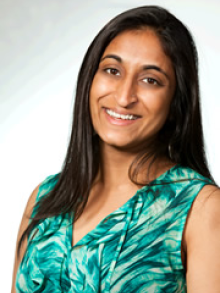Malini Patel
MPA in Public & Nonprofit Management & Policy
-
2000

Tell us about your current public service work. Can you briefly describe your employment organization and position responsibilities, as well as any relevant volunteer or entrepreneurial activities?
As Senior Director of Middle East and North Africa (MENA) programs at Vital Voices Global Partnership, I have the opportunity to work with amazing women and men on women’s issues throughout the region. Leading an incredible team at Vital Voices, we work across 16 countries in the technical areas of entrepreneurship and economic development, political and public life, and human rights while also promoting public-private dialogue and partnerships, advocacy, mentoring, and networking. We address the needs identified by women and support the work they do. These individuals are working for a better future for everyone. They are passionate, committed, strong, and caring. There is tremendous opportunity in the MENA region, and I believe women in the region are taking on the challenges faced by their communities.
Please summarize your professional and academic background. What has been a highlight?
I have been working in the international development arena for over 15 years. After serving as a Peace Corps Volunteer in Zambia, I worked almost full time while pursuing my masters at Wagner. My career has included consulting in Russia, working on public private partnerships for the Latin America and the Caribbean region at Peace Corps Headquarters, and providing leadership as Deputy Director and Acting Regional Director for international development programming across Middle East, Europe, and the Caucasus at CHF International. I have overseen technical programs related to humanitarian assistance; conflict resolution; community development; governance; advocacy; municipal development; economic development; and organizational development.
What led you to pursue a master’s degree in Public Administration? Why did you decide to study at Wagner?
At the time I joined Wagner, there were very few masters programs focusing on international non-profit management. Wagner was at the forefront of the field. The program was designed with an understanding of the value of a) life experience, b) connecting with professionals in the field as a cornerstone of learning, c) partnering with multi-lateral and international non-profit organizations around the world, and d) aspiring for excellence in public service.
In your current position, how do you use the knowledge and skills that you gained at Wagner? Which skills do you use most frequently?
Leadership and management led by a purpose and with a global lens are the skills I use most frequently. The art of leadership and management is not always understood nor well implemented in organizations. My time at Wagner offered me the opportunity for self-reflection, conversations with international peers, and broad understanding of public service globally.
Reflecting on your academic experience, what Wagner courses, professors, and/or projects had the greatest influence on your professional development? How?
There were many courses and professors that influenced me.
• Mary McBride: marketing and strategic communication
• Roy Sparrow: managing through change
• Dennis Smith: leading international programs and building a community
• Aleya Hammad: international institutions (use and effectiveness)
• Steve Finkler: budgeting and financial analysis
It was not only the course work and the quality of the professors, but it was the passion, commitment and community at Wagner that was important. The staff and professors created an environment that encouraged debate, supported professional connections, and maintained focus on public service.
Reflecting on your time outside of the classroom (social events, orientations, trainings, etc.), can you describe one or two key moments at Wagner that impacted your passion for public service?
I already had a passion for public service, however the following two ‘out of classroom experiences’ were valuable.
• Capstone project: Demining in Mozambique
The capstone project allowed me to delve into the devastating impact of landmines on communities and the dangerous process of demining. We explored the policy implications, the role of corporations and governments, the variety of landmines in the market, mapping and remapping landmine locations, and removal techniques.
• International Public Service Organization
During my tenure, this new student organization brought together individuals who had a common interest in the international sphere. The Wagner alumni I am most in contact with today were part of IPSA and have primarily stayed engaged in international public service.
Are there any programs, opportunities or other aspects of the Wagner experience that you wish you had leveraged during your time as a student?
With unlimited time, I would have further leveraged partnerships with the foundations with an international focus as well as multinational corporations based in NYC.
How are you involved with the Wagner community as an alumna (i.e. attending events, mentoring students, maintaining connections with other alumni, recruiting at Wagner, etc.)?
• Maintaining connections with other alumni
Prospective students have expressed interest in learning how alumni funded their living expenses and education during their time as a Wagner student. If you feel comfortable, can you please tell us how you made it work?
I received a scholarship covering much of my tuition. However, Wagner’s class schedule allowed me to also work during school to fund living and other education related expenses.